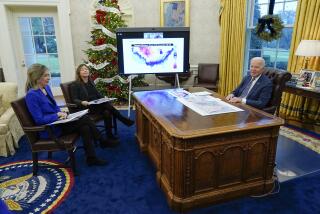Organ Recipient Seeks to Boost Donations Among Latinos
CHATSWORTH â At 2 days old, Alicia Rodriguez received a blood transfusion that left her system infected with hepatitis C. As she grew she got sicker and sicker, always expecting to die young.
But five years ago she got a new liver from a 17-year-old boy who died in a car crash. She calls him her angel.
Having been saved by the gift of a liver, Rodriguez, 28, is now on a mission to encourage organ donations from Latinos.
Armed with a $100 check from a family friend, Rodriguez founded a Valley-based nonprofit organization to promote Latino organ donations called Angels in Heaven and Earth.
And thanks to her efforts, the UCLA Medical Center will launch its first support group for Spanish-speaking people who have received donated livers.
âBecause of the gift I have been given, I cannot be frivolous with my life,â Rodriguez said in her parentsâ Mexican restaurant in Chatsworth. âIt was a gift that you protect like a child--and you do everything you can not to harm it. If I did, Iâd be cheating. Iâd be saying to him, âYour gift to me meant nothing.â â
Organ donations tend to be less common among Latinos and other minority groups than among whites, according to Gloria Bohrer, public relations director for the Southern California Organ Procurement Agency.
Members of minorities make up about 40% of those waiting for organs, but constitute fewer than a quarter of those donating, she said. In the seven Southern California counties served by Bohrerâs group, Latinos received 533 organs, but gave only 54 in the 18-month period ended last June.
âI think the obstacle is a lack of information and understanding, and that is tied to the language, and how few members of the Hispanic community are English-speaking,â Bohrer said.
Dr. Ronald Busuttil, a prominent transplant surgeon and founder of UCLAâs transplant center, praised Rodriguez for taking on the challenge of educating Latinos about the importance of organ donations.
âWe have so many Latino recipients,â Busuttil said at the kickoff event for Angels in Heaven and Earth. âIt is a godsend that we have such a hard-working person as Alicia to start this.â
It is a medical irony, perhaps, that transplantation has become a victim of its own success. As doctors improve their skills performing transplants, the shortage will become greater. Motor vehicle safety factors have reduced the number of head trauma deaths, once a major source of donations.
Furthermore, while millions of Americans indicate their willingness to donate by signing up--mostly through the driverâs license renewal process--many neglect to tell their relatives they have done so. Without family consent, regardless of the donorâs wishes, organ procurement centers will not take an organ.
How that plays out largely depends on awareness and education, which remain woefully inadequate in the Spanish-speaking community, experts say.
Rodriguez wants to change that.
*
She said hospitals offer support groups for English-speaking organ recipients, but generally not for Spanish speakers.
Dr. Douglas Farmer, an associate professor of surgery at the Dumont-UCLA Transplant Center, in the division of liver and pancreas transplantation, performed Rodriguezâs transplant and developed a close working relationship with her.
Over time, he became her facilitator, listening to her ideas and encouraging them.
As a surgeon in the operating room, Farmer has felt firsthand the frustration of Latino patients who cannot understand, and has watched how Latino families network at the hospital to exchange information.
He said 30% to 50% of his patients at UCLA are Latino, and that number is expected to grow.
âWe have a huge translational service,â Farmer said. âBut to have someone around on a minute-by-minute or hour-by-hour basis to provide information is simply not possible.â
Farmer said comprehension is especially important for transplant patients because they need to know what they are getting into.
As the months passed, Farmer urged Rodriguez to start small, and to stay focused. He also worked as her ally, smoothing and facilitating relations with the hospital.
Rodriguez envisions Angels in Heaven and Earth launching educational programs to teach Latinos about organ donation and to help Latinos through the transplant process.
Latinos also need to be aware of the need for organs among their own community. Beatriz Abellera, a Latino mother of two who is waiting for a donated liver to save her life, spoke at the kickoff, as did Cathy Perez, a Latino mother whose 5-year-old son died last spring in an auto accident.
Rodriguezâs mission has an urgency, because even as she fights the status quo, she has suffered a medical setback.
Two months after she received her new liver, she was diagnosed with leukemia. She underwent chemotherapy and it went into remission. But the treatment caused her body to begin rejecting her new liver. She could not get another because she was considered high risk.
Her doctors got her into a study group for a medicine that was still experimental, and today she has stabilized. But she does not know if the leukemia will return, or her body will ultimately reject the liver.
More to Read
Sign up for Essential California
The most important California stories and recommendations in your inbox every morning.
You may occasionally receive promotional content from the Los Angeles Times.










